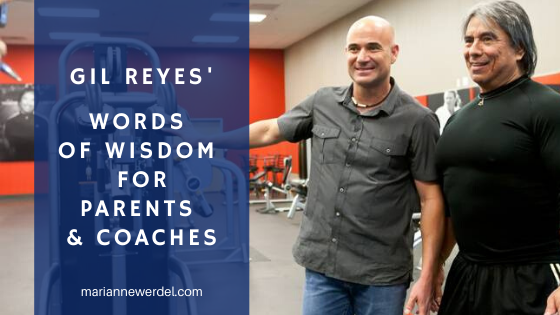
I was recently invited to be part of a USTA Foundation Fantasy Camp at the USTA Campus in Orlando, Florida. It was an incredible weekend with many great speakers and coaches, including Chris Evert, Sloane Stephens, Nick Bollettieri, Jim Courier, Jimmy Arias, and Brian Godfried. One of my favorite events was having breakfast with Gil Reyes, Andre Agassi’s (and many other top players’) long-time trainer.

All professional athletes have trainers and physios to guide their training specifically for their sport. Very few of these trainers become well-known out of their sport. Gil Reyes made his name as a key member of the basketball program at the UNLV, under Jerry Tarkanian, before turning Andre Agassi into one of the finest athletes on the ATP Tour. Reyes toured with Andre for 17 years, and Agassi attributes much of the success he experienced during the second half of his career to his trainer and close friend. “Gil is the reason I’ve won more Slams after the age of 29 than I did before,” Agassi said in 2005. Reyes has gone on to train multiple top tennis players and continues to work with the best players in the world out of his Las Vegas gym.
Gil Reyes is an imposing figure and yet, surprisingly sensitive and protective when speaking about the bond between athletes and their coaches. We enjoyed breakfast as a group, with top donors from the USTA Foundation, coaches, and the kids in the NJTL Excellence Team College Pathway Camp. It was very moving to have the kids sharing breakfast directly with the donors who made it possible for them to play competitive tennis at the elite level.

After the breakfast, Gil shared some of his “Words of Wisdom for Parents & Coaches”.
1. First thing you say to your athlete: “I will love you, respect you, and protect you, whether you win or lose. My love and support have nothing to do with a win or a loss.”
2. I tell my athletes, “We are all dreamers. I hope your backbone is as big as your wishbone.” You must be ALL IN. Wishing and hoping doesn’t get you anywhere, you must be committed to the work.
3. When an athlete is struggling, and you don’t know the answer, speak the truth. “I don’t know, but we are going to figure this out together.”
4. Fear can be a good thing. Fear means you care. “Don’t pray to be fearless; pray to be brave.”
5. You can’t make a career in one day, but you can destroy it in a day with a wrong decision. Listen. Listen to your athlete, listen to the results, and listen to their body. Contradiction will reveal itself.

6. Make the athlete feel safe. Safe to let you in on what scares them, makes them feel vulnerable, and what makes them tick! To be successful in life as well as in the sport, the athlete must feel safe and free to be themselves.
7. You must relate to the athlete. You empower them. As former professional athletes, we have been where they are going. You can guide them, but you must empower them to do it themselves.
8. When developing your athlete, ask yourself, “Are you BUILDING them up or BEATING them up?” You must first build a connection with the individual to know them well enough to make sure you are building them up and not tearing them down. Become builders! Build the athlete. Find out what they need. We are not all the same. It won’t be the same with each athlete. What you say to fire someone up may crush another athlete.
9. Parents as coaches- Coaching an elite athlete is a demanding job and takes significant time. If a parent is a coach to an athlete, they most likely aren’t home for the rest of the family. If the family unit breaks down, everyone loses. A stable home life helps the athlete feel more safe and secure.
10. Parents are essential to the athlete’s team, but parents need to make sure it isn’t to the detriment of the athlete. Don’t confuse the player by giving them a different message. You want the player to see you and be strengthened that you are there for them. If they are not stronger with you there, then you need to re-evaluate the relationship.
Gil also mentioned his favorite book for coaches and how he defines himself as a coach, “Season of Life”, by Jeffrey Marx. I downloaded it for my flight home and couldn’t put it down. This book hit home with me on multiple fronts, as a coach and as a mother of boys. Much of his philosophy on coaching and sports are similar to the experiences my boys have had playing football. I immediately realized that this book had articulated the reasons I am grateful for the coaches my sons have had in their lives.
Thanks for reading and have a great Thanksgiving week!

Related Posts
Student-Athlete’s Recruiting Workbook
“College is a match to be made, not a prize to be won.”…
November 21, 2019Five Tips to Make Adversity Plus Failure Equal Success!
Thank you, Debbie Graham Shaffer, for sharing a great piece on the importance of our…
November 21, 2019

